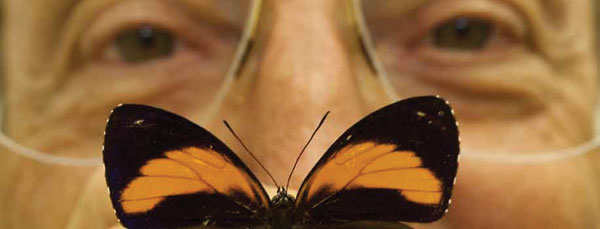Extracts

Lepidoptera Donation Boosts Biodiversity Research
A gift of more than 2 million butterfly and moth specimens to the University of Florida contains hundreds and possibly more than 1,000 new unnamed species, and will help researchers better understand biodiversity and environmental changes.
The gift to the Florida Museum of Natural History from Dr. William and Nadine McGuire of Wayzata, Minn., is valued at more than $41 million and includes funding for curation of the Lepidoptera collection, ongoing taxonomic and biodiversity-related research, training of scientists and publication of books and relevant papers. The gift brings the number of specimens in UF’s collection to more than 9 million, one of the world’s largest.
“It is important that both the world’s scientific community and the general public recognize that one of the compelling issues of the early 21st century is the global threat to the present diversity of life on Earth,” Bill McGuire said. “It is our belief that this threat to biodiversity demands a stepped-up educational and research effort on the part of universities and governments worldwide.”
UF President Bernie Machen welcomed the McGuires’ gift and said it speaks volumes about the university’s place in environmental studies.
“The McGuires’ support of biodiversity and Lepidoptera research at UF helps solidify the university’s major commitment to understanding and preserving biodiversity and the environment,” Machen said. “This private sector support of global issues is the mark of true, selfless philanthropy.”
The Florida Museum of Natural History houses the McGuire Center for Lepidoptera and Biodiversity, named for the McGuires after previous gifts. McGuire Center Director Thomas Emmel said this “unparalleled and unique” gift includes butterflies from every continent except Antarctica, and from geographic sites no longer accessible to scientists.
“It will take years to completely curate this collection, but we know it contains hundreds, and possibly more than 1,000, species new to science,” Emmel said.
Emmel said Lepidoptera research is critical to the study of the world’s ecosystems because butterflies are good flagship species to assess environmental health.
Many ecologists worldwide now use butterfly and moth species as indicators for the overall biodiversity of an ecosystem or plant and animal community.
“Like canaries warning miners of dangerous gases in coal mines, the Lepidoptera are particularly sensitive to poisons in the environment, such as pesticides or heavy metals,” Emmel said.
Tom Emmel, tcemmel@ufl.edu